8 Supplements That Actually Prevent Hangovers, Doctors Say
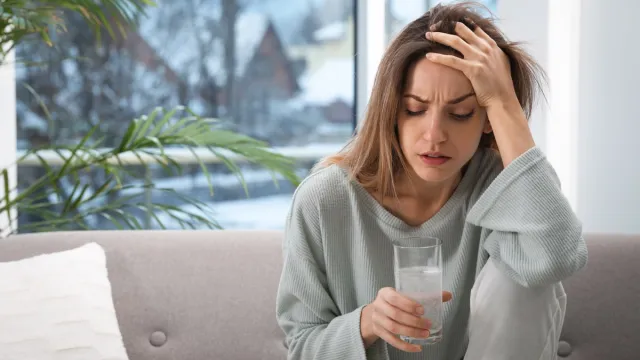
There are few worse feelings than waking up after a night out and feeling a wave of nausea and a pounding head. Depending on how much alcohol you indulged in, that hangover can be downright debilitating—and have you swearing you’ll never drink again. But while we all know drinking less and hydrating more can help you avoid a hangover, sometimes you’re having too good a time to be worrying about the next morning. So, if you do have plans to have a few drinks in the future, you might want to consider adding certain supplements to your getting-ready routine. Read on for eight supplements that doctors say can actually prevent hangovers.
RELATED: 12 Supplements You Should Never Take Together, Medical Experts Say.
1
B-complex vitamins
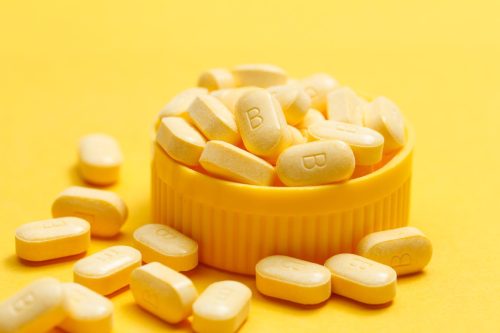
Multiple experts recommend looking into B vitamins before a big night of drinking. According to Claire Rifkin, MS, registered dietitian nutritionist and founder of telehealth private practice Claire Rifkin Nutrition, LLC, when the liver metabolizes alcohol, it’s converted to acetaldehyde—the toxic compound that leads to hangover symptoms—and then broken down into acetic acid, which is less harmful.
However, when the liver has too much alcohol to process, it inhibits the ability to break down acetaldehyde, leaving us with headaches, nausea, and fatigue. That’s where B vitamins can help.
“When we drink alcohol our body uses B vitamins in the biochemical processes of breaking down the toxic byproducts of acetaldehyde,” Rifkin explains. “Additionally, the metabolism of alcohol shifts the balance in our cells, increasing the need for B vitamins to help restore normal function.”
She continues, “Because B vitamins are so crucial in the metabolism of alcohol, we can easily become depleted. So taking a B-complex supplement before and after drinking can help replenish the stores used during this process.”
Look for vitamin B complex, specifically, which will contain vitamin B1 (thiamine), B2 (riboflavin), B6 (pyridoxine), B9 (folic acid), and B12 (cobalamin), HaVy Ngo-Hamilton, PharmD, clinical consultant and pharmacy editor at BuzzRx, recommends.
RELATED: 5 Surprising Benefits of Taking Vitamin B-12 Every Day.
2
L-cysteine (N-acetyl cysteine)
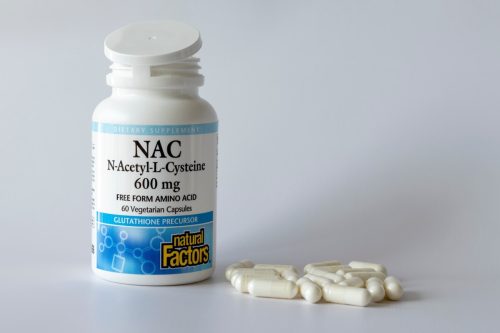
Medical professionals also say that L-cysteine can help ward off a hangover.
“L-cysteine is an amino acid supplement that may help prevent a hangover by supporting your liver as it flushes the alcohol out of your body,” Patricia Pinto-Garcia, MD, MPH, senior medical editor at GoodRx, tells Best Life.
To get L-cysteine, you take a supplement in the form of N-acetyl cysteine (NAC). NAC converts to L-cysteine in the body—and, as Rifkin explains, it then plays a role in the production of glutathione, an antioxidant that’s depleted when we drink excessive amounts of alcohol.
For those who indulge in a few drinks regularly, it might be worth it to introduce NAC daily “to protect your liver,” says Jeanette Giacinto, MS, registered dietitian, and certified dietitian nutritionist at Bodybuilding Reviews. However, she cautions that you should talk to your doctor before doing so.
3
Magnesium
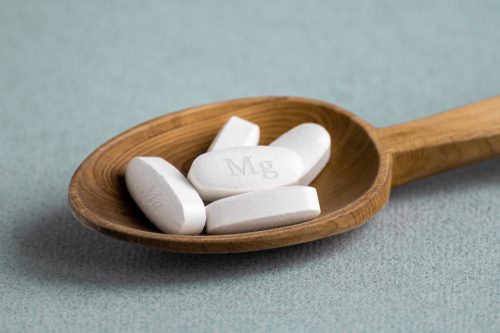
While different kinds of magnesium can be beneficial for a number of reasons, it’s also a helpful line of defense when it comes to hangovers.
“Poor sleep is the cause of many hangover symptoms,” Daryl Gioffre, doctor of chiropractic (DC), nutritionist and gut health expert, and founder of Alkamind, tells Best Life. “But magnesium calms your nervous system, relaxes your muscles, and maintains your body’s GABA levels so that you can have the best sleep ever.”
According to Amber Robins, MD, a double board-certified family and lifestyle medicine doctor, magnesium is also a common ingredient in “the banana bag,” which is a treatment given through an IV.
These are often administered at the hospital when patients come in with alcohol intoxication or withdrawal, but they’re also available through independent IV drip companies, which advertise them for hangovers and dehydration, among other ailments. Banana bags also typically contain B vitamins like thiamine and folic acid, Robins says.
RELATED: 7 Surprising Benefits of Taking Magnesium Every Day.
4
Niacin (vitamin B3)
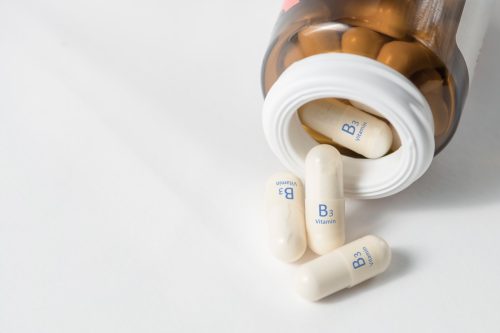
Vitamin B3, specifically, is useful to prevent a hangover—especially when paired with zinc.
Working in tandem with zinc, this supplement can help metabolize alcohol, Giacinto says. Even more encouraging, she points to research that shows people with a “greater intake of these micronutrients experience less severe hangovers.”
5
Vitamin C
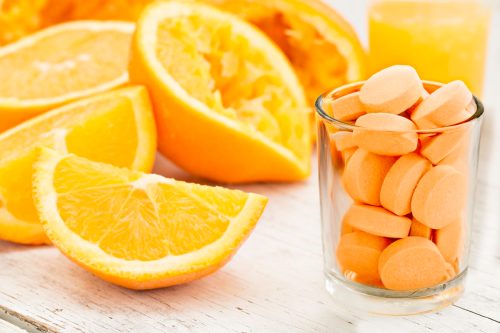
Like NAC, vitamin C helps with the regeneration of glutathione.
“By replenishing glutathione levels, vitamin C helps the body to process and eliminate acetaldehyde, potentially reducing hangover severity more efficiently,” Rifkin tells Best Life.
RELATED: 21 Surprising Signs You Have a Vitamin Deficiency.
6
Activated charcoal
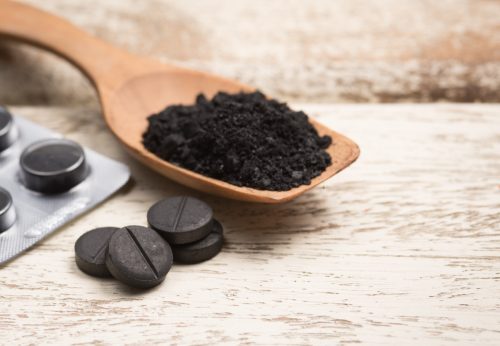
According to Amy Myers, MD, functional medicine physician and founder of Amy Myers, MD, activated charcoal should also be on your list to keep hangovers at bay.
“One of the most popular uses for activated charcoal is hangover prevention,” she shares. “After all, alcohol is a toxin, and activated charcoal is a binder that absorbs toxins in your body.”
As such, activated charcoal can adsorb this toxin via its porous structure, Catherine Gervacio, registered dietitian and certified exercise nutrition coach of E-Health Project. “This means that it binds to the toxins produced by alcohol so it won’t get absorbed by the body,” she explains.
Myers stresses that it’s important to take activated charcoal before drinking, as doing so after a night out “won’t do much to remove the alcohol,” and could backfire and lead to more nausea and vomiting.
7
Clove extract
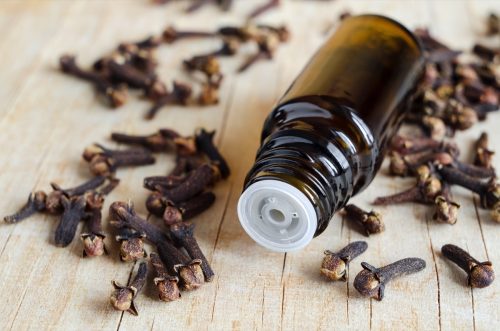
Also on Pinto-Garcia’s list of preventive hangover supplements is clove extract, which “may help reduce oxidative stress from inflammation.”
In a 2018 study published in the Journal of Medicinal Food, researchers found that those who took a clove extract supplement had faster elimination of blood acetaldehyde and a 55.34 percent reduction in hangover severity, compared to those taking a placebo.
RELATED: 10 Supplements That Actually Help You Wake Up in the Morning.
8
Prickly pear extract

Natural supplements like prickly pear extract may also help keep hangovers away. According to Pinto-Garcia, this supplement can prevent nausea.
When looking at prickly pear extract (Opuntia ficus indica), researchers found that it had a “moderate effect on reducing hangover symptoms, apparently by inhibiting the production of inflammatory mediators.”
Why do I get hungover?
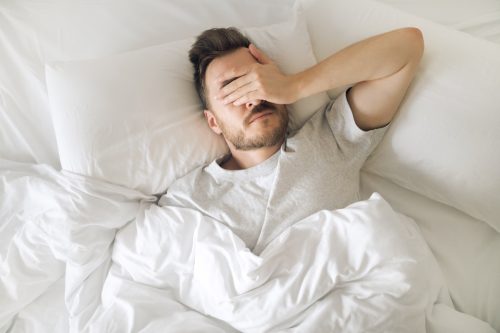
In general, we know that a hangover is caused by alcohol, but what about the science behind it?
According to Pinto-Garcia, hangovers are largely caused by the fact that drinking alcohol makes you dehydrated.
“Alcohol makes you pee more. If you’re not drinking extra fluids to replace what you’re losing, a night of drinking will make you dehydrated,” she explains. “The more you drink, the more dehydrated you’ll get. Dehydration is responsible for classic hangover symptoms like headaches, fatigue, and that general sense of not feeling well.”
In addition, alcohol can affect your sleep—making you more likely to feel tired and groggy in the morning—and irritate your stomach, causing those uncomfortable gastrointestinal symptoms.
Finally, that tricky compound acetaldehyde causes inflammation, which your body needs time to clear. (The more you drink, the higher your acetaldehyde levels, Pinto-Garcia notes.)
So, once the damage is done, you’re left pretty much riding that wave, as there’s no hangover “cure.” The only way to ensure you’re in tip-top shape the next day is to avoid alcohol in general.
Experts also remind you to talk to your healthcare provider before introducing new supplements to your diet, especially if you’re taking other medications that could lead to a negative interaction.
Best Life offers the most up-to-date information from top experts, new research, and health agencies, but our content is not meant to be a substitute for professional guidance. When it comes to the medication you’re taking or any other health questions you have, always consult your healthcare provider directly.
- Source: Alcohol Clinical & Experimental Research: Mechanisms of Vitamin Deficiencies in Alcoholism
- Source: Addiction: The efficacy and tolerability of pharmacologically active interventions for alcohol-induced hangover symptomatology: a systematic review of the evidence from randomised placebo-controlled trials
- Source: Expert Opinion on Biological Therapy: N-acetylcysteine for antioxidant therapy: pharmacology and clinical utility
- Source: Journal of Clinical Medicine: Dietary Nutrient Intake, Alcohol Metabolism, and Hangover Severity
- Source: The American Journal of Clinical Nutrition: Vitamin C elevates red blood cell glutathione in healthy adults
- Source: Journal of Medicinal Food: Clove Bud Polyphenols Alleviate Alterations in Inflammation and Oxidative Stress Markers Associated with Binge Drinking: A Randomized Double-Blinded Placebo-Controlled Crossover Study
- Source: The Archives of Internal Medicine: Effect of Opuntia ficus indica on symptoms of the alcohol hangover